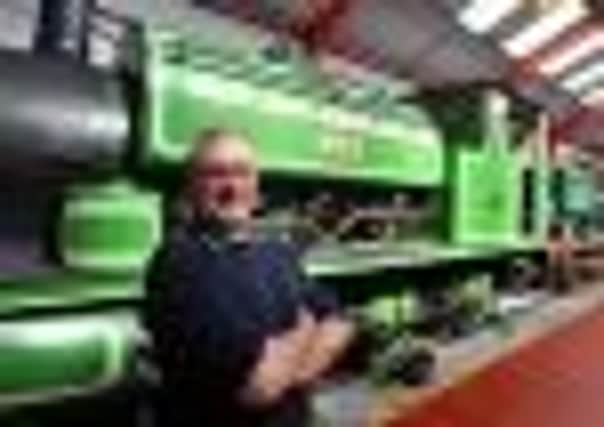Full steam ahead into the past for world’s oldest line


On June 24, 1812, a steam haulage system designed by John Blenkinsop, of Middleton Colliery and by Matthew Murray, of Fenton, Murray and Wood, began operations on the Middleton Railway, hauling coal from a mine to the River Aire.
Now 200 years on from the first time the commercial steam locomotive Salamanca trundled down its tracks, the trust’s volunteers are holding a major celebration weekend to honour the railway’s vital role in Yorkshire’s industrial heritage.
Advertisement
Hide AdAdvertisement
Hide AdThose first locomotives were made possible by a pioneering rack and pinion system which solved the problem that engines light enough for the brittle cast iron tracks in use then did not have enough traction.
Mr Blenkinsop’s invention solved a problem which had been baffling engineers across Britain for years and made Middleton Railway the first ever to successfully use steam locomotives in a commercial environment.
In the years that followed, as demand for coal rocketed and horses were snapped up to serve in the Crimean War, Leeds became a world-leader in designing steam locomotives and nearby Hunslet was transformed into a square-mile of eight different foundries, all producing steam engines that were shipped as far afield as India, Africa, Japan and the West Indies.
Locomotives hauling coal thundered along the Middleton Railway at all times of day and night, fuelling Great Britain’s unprecedented growth through the Victorian age.
Advertisement
Hide AdAdvertisement
Hide AdCommercial traffic on the railway ceased in the 1960s and it was taken over by a group of enthusiasts from Leeds University who formed the Middleton Railway Trust.
“Middleton’s contribution is massive,” said Andrew Gill, chairman of the trust.
“It kicked the whole thing off.
“This happened 17 years before Stephenson’s Rocket which most people think was the first steam locomotive in the world.
“Everything was moved by horses but the animals were becoming in huge demand and almost unaffordable.
Advertisement
Hide AdAdvertisement
Hide Ad“And in the days before steel where all the tracks were cast iron, if you had a heavy steam locomotive then they kept breaking. If it hadn’t happened in Leeds it probably would have eventually been invented somewhere else.
“But the industrial revolution and steam has made this city what it is.
“During its heyday, engineers in Leeds built more steam locomotives than any other town or city in England.
“By 1850 there were four big manufacturers in Leeds and by 1860 there were eight manufacturers.
Advertisement
Hide AdAdvertisement
Hide Ad“It wasn’t just the UK that had the demand stemming from the industrial revolution, these locomotives were being shipped to places all over the world.
“I don’t think we exported to Greenland, because it didn’t have any railway tracks, and there was an area in the middle of the Himalayas.
“But they pretty much went everywhere else across the globe.
“One of the locomotives we will have on show during the event was exported to Trinidad where all of its life was spent working on a sugar cane plantation.
“But now it has been returned back here.”
Advertisement
Hide AdAdvertisement
Hide AdThe all-steam gala event to mark the 200th anniversary of steam power is taking place over June 23 and June 24. More than 1,000 visitors are expected to attend.
Over the weekend it is hoped 200 steam engines, ranging from the four locomotives still based at the railway, to two-inch models.
Steam lorries and traction engines will also be on show alongside three guest locomotives arriving from heritage railways across the north, including one from the Vintage Carriages Trust based on the Keighley and Worth Valley Railway.
Meanwhile, a vintage bus will be ferrying enthusiasts from Leeds train station and Leeds bus station to the Middleton Railway for the event throughout the weekend.
Advertisement
Hide AdAdvertisement
Hide Ad“It is an extremely important event not just for Yorkshire but to remind us of what made Great Britain great,” Mr Gill said.
“Our economy now is not based on anything concrete.
“But 100 years ago it was all very different.
“Everything was underpinned by manufacturing and our workers were able to develop unique skills that were some of the best in the world.
“Leeds now is a very cosmopolitan place and there will be people who don’t know where the roots of the city came from – we hope this event can change that. But I’m not sure now we will ever get back to that prominence on the world stage again.”